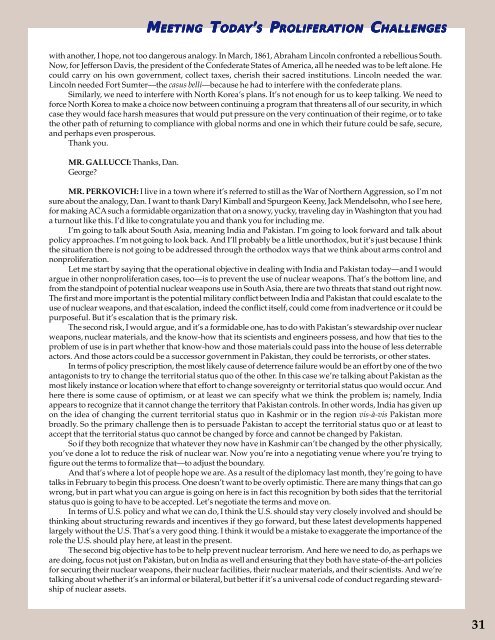test_pdf.pdf
You also want an ePaper? Increase the reach of your titles
YUMPU automatically turns print PDFs into web optimized ePapers that Google loves.
MEETING<br />
TODA<br />
ODAY’S PROLIFERA<br />
ROLIFERATION<br />
CHALLENGES<br />
with another, I hope, not too dangerous analogy. In March, 1861, Abraham Lincoln confronted a rebellious South.<br />
Now, for Jefferson Davis, the president of the Confederate States of America, all he needed was to be left alone. He<br />
could carry on his own government, collect taxes, cherish their sacred institutions. Lincoln needed the war.<br />
Lincoln needed Fort Sumter—the casus belli—because he had to interfere with the confederate plans.<br />
Similarly, we need to interfere with North Korea’s plans. It’s not enough for us to keep talking. We need to<br />
force North Korea to make a choice now between continuing a program that threatens all of our security, in which<br />
case they would face harsh measures that would put pressure on the very continuation of their regime, or to take<br />
the other path of returning to compliance with global norms and one in which their future could be safe, secure,<br />
and perhaps even prosperous.<br />
Thank you.<br />
MR. GALLUCCI: Thanks, Dan.<br />
George?<br />
MR. PERKOVICH: I live in a town where it’s referred to still as the War of Northern Aggression, so I’m not<br />
sure about the analogy, Dan. I want to thank Daryl Kimball and Spurgeon Keeny, Jack Mendelsohn, who I see here,<br />
for making ACA such a formidable organization that on a snowy, yucky, traveling day in Washington that you had<br />
a turnout like this. I’d like to congratulate you and thank you for including me.<br />
I’m going to talk about South Asia, meaning India and Pakistan. I’m going to look forward and talk about<br />
policy approaches. I’m not going to look back. And I’ll probably be a little unorthodox, but it’s just because I think<br />
the situation there is not going to be addressed through the orthodox ways that we think about arms control and<br />
nonproliferation.<br />
Let me start by saying that the operational objective in dealing with India and Pakistan today—and I would<br />
argue in other nonproliferation cases, too—is to prevent the use of nuclear weapons. That’s the bottom line, and<br />
from the standpoint of potential nuclear weapons use in South Asia, there are two threats that stand out right now.<br />
The first and more important is the potential military conflict between India and Pakistan that could escalate to the<br />
use of nuclear weapons, and that escalation, indeed the conflict itself, could come from inadvertence or it could be<br />
purposeful. But it’s escalation that is the primary risk.<br />
The second risk, I would argue, and it’s a formidable one, has to do with Pakistan’s stewardship over nuclear<br />
weapons, nuclear materials, and the know-how that its scientists and engineers possess, and how that ties to the<br />
problem of use is in part whether that know-how and those materials could pass into the house of less deterrable<br />
actors. And those actors could be a successor government in Pakistan, they could be terrorists, or other states.<br />
In terms of policy prescription, the most likely cause of deterrence failure would be an effort by one of the two<br />
antagonists to try to change the territorial status quo of the other. In this case we’re talking about Pakistan as the<br />
most likely instance or location where that effort to change sovereignty or territorial status quo would occur. And<br />
here there is some cause of optimism, or at least we can specify what we think the problem is; namely, India<br />
appears to recognize that it cannot change the territory that Pakistan controls. In other words, India has given up<br />
on the idea of changing the current territorial status quo in Kashmir or in the region vis-à-vis Pakistan more<br />
broadly. So the primary challenge then is to persuade Pakistan to accept the territorial status quo or at least to<br />
accept that the territorial status quo cannot be changed by force and cannot be changed by Pakistan.<br />
So if they both recognize that whatever they now have in Kashmir can’t be changed by the other physically,<br />
you’ve done a lot to reduce the risk of nuclear war. Now you’re into a negotiating venue where you’re trying to<br />
figure out the terms to formalize that—to adjust the boundary.<br />
And that’s where a lot of people hope we are. As a result of the diplomacy last month, they’re going to have<br />
talks in February to begin this process. One doesn’t want to be overly optimistic. There are many things that can go<br />
wrong, but in part what you can argue is going on here is in fact this recognition by both sides that the territorial<br />
status quo is going to have to be accepted. Let’s negotiate the terms and move on.<br />
In terms of U.S. policy and what we can do, I think the U.S. should stay very closely involved and should be<br />
thinking about structuring rewards and incentives if they go forward, but these la<strong>test</strong> developments happened<br />
largely without the U.S. That’s a very good thing. I think it would be a mistake to exaggerate the importance of the<br />
role the U.S. should play here, at least in the present.<br />
The second big objective has to be to help prevent nuclear terrorism. And here we need to do, as perhaps we<br />
are doing, focus not just on Pakistan, but on India as well and ensuring that they both have state-of-the-art policies<br />
for securing their nuclear weapons, their nuclear facilities, their nuclear materials, and their scientists. And we’re<br />
talking about whether it’s an informal or bilateral, but better if it’s a universal code of conduct regarding stewardship<br />
of nuclear assets.<br />
31<br />
31
















